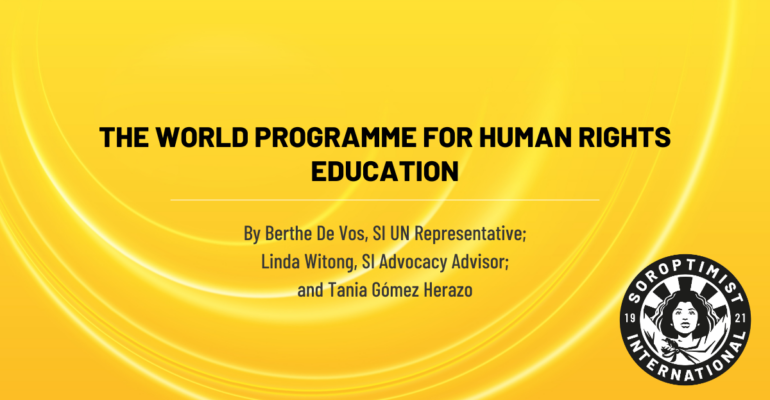Blog drafted on the report of SI UN Representatives in Geneva, Berthe De Vos; SI Advocacy Advisor, Linda Witong; and Tania Gómez Herazo.
In an increasingly interconnected and digital world, human rights education (HRE) becomes ever more critical. The forthcoming fifth phase of the World Programme for Human Rights Education (WPHRE) for the period 2025-2029, as outlined by Soroptimist International, aims to address the evolving educational needs, especially concerning digital technologies, gender equality, and environmental awareness. This article delves into the recommendations and priorities set forth in the report, emphasising the importance of a comprehensive and inclusive approach to HRE.
The World Programme for Human Rights Education
The WPHRE, a significant initiative of the United Nations (UN), seeks to integrate human rights principles into educational systems globally. The upcoming fifth phase represents a pivotal moment in aligning educational strategies with the broader goals of the 2030 Agenda for Sustainable Development, particularly Sustainable Development Goal (SDG) Target 4.7 (Education for Sustainable Development and Global Citizenship). This phase prioritises the empowerment of women and girls, reflecting the global shift towards inclusivity and equal opportunity.
Comprehensive National Strategies
The report underscores the necessity for states to develop comprehensive national strategies that encompass all forms of education, from formal to non-formal settings. These strategies should be inclusive of all women and girls, with a particular focus on those in vulnerable situations, such as those with disabilities, from minority groups, or living in conflict-affected areas. The call for meaningful participation of women and girls in designing, implementing, and monitoring these strategies is critical. It ensures that the educational content is relevant and empowering, enabling women and girls to navigate the complexities of the modern world.
Digital Literacy and Lifelong Learning
In an era where digital skills are indispensable, the report highlights the need for integrating digital literacy into educational curricula. This integration is not merely about teaching technical skills but also about fostering critical thinking to safely navigate the digital landscape. The rise of digital technologies presents both opportunities and challenges, such as the potential spread of misinformation and privacy concerns. Therefore, education systems must equip learners with the skills to critically evaluate digital content and understand their rights online.
The emphasis on lifelong learning is another crucial aspect of the recommendations. The rapidly changing job market, influenced by automation and technological advancements, requires continuous learning and skill acquisition. Lifelong learning programs should be accessible to women of all ages, enabling them to adapt to new job requirements and ensuring their inclusion in the workforce.
Environmental and Climate Change Education
The fifth phase also aims to incorporate environmental and climate change education, recognising the vital role of education in fostering sustainable lifestyles. Understanding the causes and impacts of environmental issues empowers individuals to take informed actions towards sustainability. Gender equality education, another key focus area, aims to dismantle stereotypes and promote equal opportunities, encouraging women and girls to participate fully in all aspects of life, including science, technology, engineering, and mathematics (STEM) fields.
International Cooperation and Resource Mobilisation
The report calls for enhanced international cooperation to support the implementation of human rights education programs. This cooperation includes sharing best practices, providing technical assistance, and mobilising resources. The report stresses the importance of resources from various sectors, including governments, international organisations, and the private sector, to ensure the successful execution of these educational strategies.
Conclusion
The fifth phase of the World Programme for Human Rights Education represents a comprehensive approach to equipping individuals, especially women and girls, with the knowledge and skills necessary to thrive in a rapidly changing world. By focusing on digital literacy, gender equality, and environmental education, the programme aims to create a more informed and empowered global citizenry. As we look forward to the implementation of these strategies, the role of educators, policymakers, and international organisations will be crucial in shaping a future where education serves as a foundation for human rights and sustainable development.

